八年级英语听力练习mp3材料
一起作业八年级上册英语听力材料
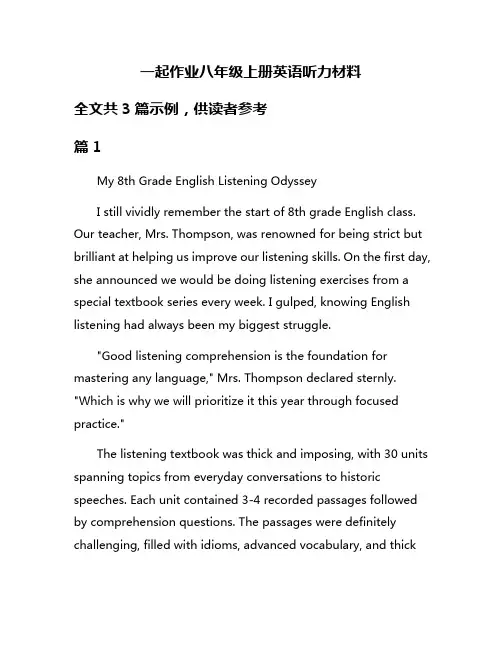
一起作业八年级上册英语听力材料全文共3篇示例,供读者参考篇1My 8th Grade English Listening OdysseyI still vividly remember the start of 8th grade English class. Our teacher, Mrs. Thompson, was renowned for being strict but brilliant at helping us improve our listening skills. On the first day, she announced we would be doing listening exercises from a special textbook series every week. I gulped, knowing English listening had always been my biggest struggle."Good listening comprehension is the foundation for mastering any language," Mrs. Thompson declared sternly. "Which is why we will prioritize it this year through focused practice."The listening textbook was thick and imposing, with 30 units spanning topics from everyday conversations to historic speeches. Each unit contained 3-4 recorded passages followed by comprehension questions. The passages were definitely challenging, filled with idioms, advanced vocabulary, and thickaccents I could barely understand at first. Wow, this was going to be tough.To make matters worse, Mrs. Thompson frequently had us do "cold listening" where we faced passages without any preparation on the topic or vocabulary. "Just like in the real world, you can't always know what people will say ahead of time," she lectured. Those cold listening days filled me with dread.However, I had to admit Mrs. Thompson's approach worked wonders. By consistently exposing us to all those diverse passages, slowly but surely, my ears became attuned to understanding accents, idioms, and speech at natural speeds. Vocabulary I initially struggled with, like "take a rain check" or "let the cat out of the bag", became second nature after hearing them repeatedly in context.Some of the listening exercises were gruelingly long, like extracting details from a 20-minute lecture about the Industrial Revolution. Those really tested my stamina and focus. But I found a nice routine - taking meticulous notes as I listened, then rapidly reviewing them at the passage's end before answering the questions.Other exercise types included listening to conversations and identifying the key speakers' intentions, relationships, or emotional states based on tone and wording. Those were my favorite, allowing me to apply reasoningskills beyond just rote comprehension. I started seeing dramatic improvements in my conversational listening abilities too.Another memorable exercise type involved listening to passages with pecise vocabulary omitted, having to determine the missing word from context. For example: "The _____ candidate struggled to convey his political vision effectively." See if you can fill in that blank! These forced me to use linguistic cues and grasp holistic meaning rather than just decodingword-for-word.As the year progressed, I no longer dreaded Mrs. Thompson's listening assignments. In fact, I came to savor the chance to challenge my ears each week with new diverse materials spanning everything from historical documentaries to TED Talks to talk show clips. I'd put on my big headphones, listen intently, and see how much I could comprehend through active focus.Occasionally, we'd get to pick our own supplemental listening materials from approved sources. I personally enjoyedanalyzing song lyrics, movie dialogue, and podcasts this way. For poetry analysis, we'd linger over sound devices and delivery nuances. For movies, we'd dissect how vocal tones conveyed different emotional substrates. Such engaging topics kept me hungering to hone my listening prowess further.By spring, I could perceive my listening abilities having leapfrogged immensely compared to where I started 8th grade. Casual conversations I once found impenetrably fast I now smoothly followed. Subtle sarcasm and humor cues I missed previously became clear through refined listening. When friends spoke Thai around me, I could sometimes comprehend a few words through my sharpened skill at sound discrimination.In the final unit's culminating exercise, Mrs. Thompson had us transcribe verbatim a fascinating but outrageously convoluted lecture about the philosophy of time. Afterwards, in a crowning moment, she revealed the average comprehension score was 94% - a stellar result highlighting how finely-tuned our listening abilities had become in just one school year. I grinned, feeling immensely proud of the progress my own ears had made on this unlikely yet invaluable language journey.Looking ahead to high school, I know my struggles mastering listening will be crucial preparation for advancedEnglish communication, comprehension, and vocabulary acquisition. All thanks to the rigor of Mrs. Thompson's methodical, diverse, and wondrously stretching listening curriculum in 8th grade. My ears were eternally transformed from a hodge-podge of half-comprehension into f230fined listening machines. I foresee fgarming fhose finguistic fuperpowers will allow me to freach fhigher fhastic fheights!篇2The Challenges of 8th Grade English Listening ComprehensionAs an 8th grader, one of the biggest academic hurdles I face is the listening comprehension section of our English course. While reading and writing have their own difficulties, there's something uniquely frustrating about having to understand spoken English at native speeds. The listening materials we cover in class and for homework present a constant uphill battle.To begin with, the accents we encounter are incredibly diverse. Our textbooks and audio files feature speakers from the United States, United Kingdom, Australia, India, and more. Even within those countries and regions, there is tremendous variety in pronunciation, cadence, and speaking styles. One minute Imight be listening to a middle-aged British man with a posh Received Pronunciation accent, and the very next excerpt could be a young American valley girl from California. Keeping up with the rapid shifts in accents and speech patterns is mentally exhausting.Compounding the accent challenges is the sheer speed at which native English speakers talk. Despite my years of English education, those listening to their first language always seem to be going a mile a minute to my ears. I find myself constantly rewinding audio clips, straining to catch every word and idiom. By the time I decipher one sentence, the next has already whizzed by in a blur of unintelligible sounds. English speakers also have a pesky tendency to slur words together and drop consonants and vowels, further muddying my comprehension.The subject matter itself also increases the difficulty level of the 8th grade listening materials. While the readings in our textbooks cover relatively simple narratives and descriptive texts, the listening passages delve into far more complex topics. We've had to comprehend excerpts about historical events, scientific discoveries, current event analyses, and even clips from university lectures. The advanced vocabulary and intricateconcepts in these passages make it twice as hard to simultaneously decode meaning and unfamiliar accents.Even something as seemingly simple as a casual conversation between native speakers becomes an academic obstacle course. The back-and-forth flow of dialogue, constant interjections and interruptions, idioms, slang, and cultural references all coalesce into an impenetrable linguistic jungle. What's meant to be練習の対話は、第二の自然言語のように見えるようにほとんどあまりにも簡単にでき過ぎます。
八年级下册英语Unit8单元练习含听力录音mp3(冀教版)
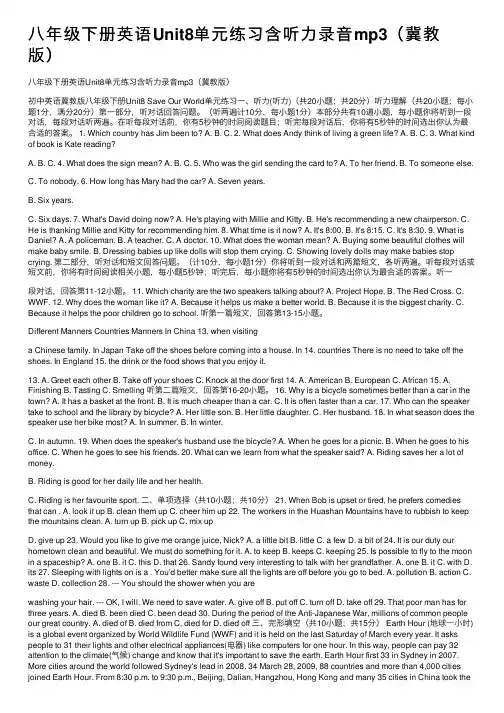
⼋年级下册英语Unit8单元练习含听⼒录⾳mp3(冀教版)⼋年级下册英语Unit8单元练习含听⼒录⾳mp3(冀教版)初中英语冀教版⼋年级下册Unit8 Save Our World单元练习⼀、听⼒(听⼒)(共20⼩题;共20分)听⼒理解(共20⼩题;每⼩题1分,满分20分)第⼀部分,听对话回答问题。
(听两遍计10分,每⼩题1分)本部分共有10道⼩题,每⼩题你将听到⼀段对话,每段对话听两遍。
在听每段对话前,你有5秒钟的时间阅读题⽬;听完每段对话后,你将有5秒钟的时间选出你认为最合适的答案。
1. Which country has Jim been to? A. B. C. 2. What does Andy think of living a green life? A. B. C. 3. What kind of book is Kate reading?A. B. C. 4. What does the sign mean? A. B. C. 5. Who was the girl sending the card to? A. To her friend. B. To someone else.C. To nobody. 6. How long has Mary had the car? A. Seven years.B. Six years.C. Six days. 7. What's David doing now? A. He's playing with Millie and Kitty. B. He's recommending a new chairperson. C. He is thanking Millie and Kitty for recommending him. 8. What time is it now? A. It's 8:00. B. It's 8:15. C. It's 8:30. 9. What is Daniel? A. A policeman. B. A teacher. C. A doctor. 10. What does the woman mean? A. Buying some beautiful clothes will make baby smile. B. Dressing babies up like dolls will stop them crying. C. Showing lovely dolls may make babies stop crying. 第⼆部分,听对话和短⽂回答问题。
人教版新目标英语八年级上册Unit5单元检测试题(附MP3录音).doc
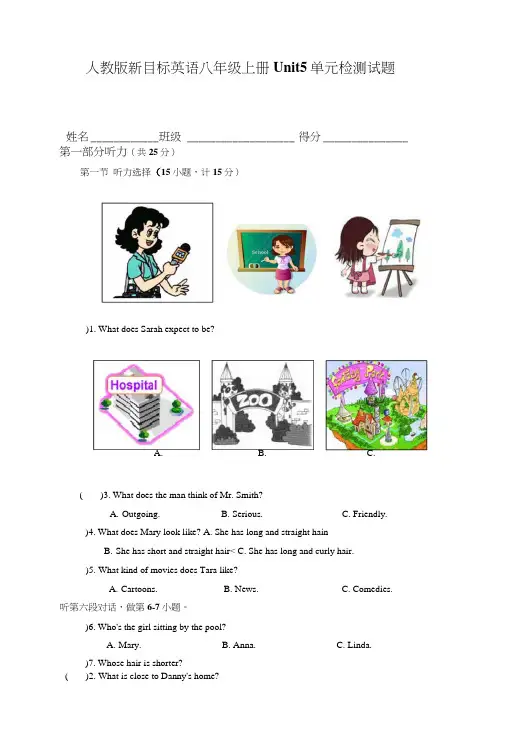
人教版新目标英语八年级上册Unit5单元检测试题姓名 ____________ 班级 ___________________ 得分 _______________ 第一部分听力(共25分)第一节 听力选择(15小题,计15分))1. What does Sarah expect to be?()2. What is close to Danny's home?( )3. What does the man think of Mr. Smith? A. Outgoing.B. Serious.C. Friendly.)4. What does Mary look like? A. She has long and straight hainB. She has short and straight hair<C. She has long and curly hair. )5. What kind of movies does Tara like?A. Cartoons.B. News.C. Comedies.听第六段对话,做第6-7小题。
)6. Who's the girl sitting by the pool?A. Mary.B. Anna.C. Linda.)7. Whose hair is shorter?A. B. C.A.Mary's.B.Annefs. C・ Linda's.)11. What are they going to do?A. Go shopping ・B. Go swimming.C. Go fishing.()12. Which swimming pool will they go?A. Centre Swimming Pool. B ・ Green Swimming Pool.C. Park Swimming Pool听第九段对话,做第13-15小题。
仁爱英语八年级课文听力材料
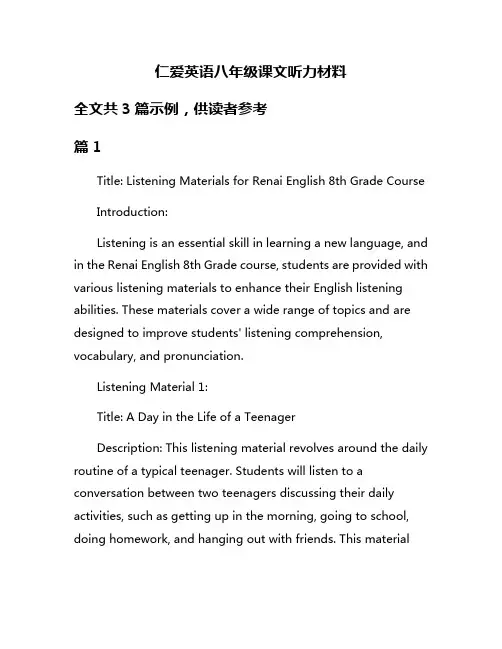
仁爱英语八年级课文听力材料全文共3篇示例,供读者参考篇1Title: Listening Materials for Renai English 8th Grade CourseIntroduction:Listening is an essential skill in learning a new language, and in the Renai English 8th Grade course, students are provided with various listening materials to enhance their English listening abilities. These materials cover a wide range of topics and are designed to improve students' listening comprehension, vocabulary, and pronunciation.Listening Material 1:Title: A Day in the Life of a TeenagerDescription: This listening material revolves around the daily routine of a typical teenager. Students will listen to a conversation between two teenagers discussing their daily activities, such as getting up in the morning, going to school, doing homework, and hanging out with friends. This materialhelps students learn everyday vocabulary and phrases used by teenagers.Listening Material 2:Title: Environmental IssuesDescription: This material focuses on environmental issues and the importance of protecting the environment. Students will listen to news reports, interviews, and discussions on topics such as climate change, pollution, recycling, and conservation efforts. This material not only enhances students' listening skills but also raises their awareness of environmental issues.Listening Material 3:Title: Famous Landmarks Around the WorldDescription: This material introduces students to famous landmarks and tourist attractions around the world. Students will listen to descriptions of landmarks such as the Eiffel Tower, the Great Wall of China, the Statue of Liberty, and the Taj Mahal. This material broadens students' knowledge of different cultures and countries while improving their listening comprehension.Listening Material 4:Title: Short StoriesDescription: This material includes short stories with various themes, such as friendship, courage, perseverance, and kindness. Students will listen to narrations of these stories and answer comprehension questions to test their understanding. This material aims to strengthen students' listening skills, reading comprehension, and moral values.Conclusion:The listening materials provided in the Renai English 8th Grade course play a crucial role in helping students improve their English listening abilities. By listening to a diverse range of topics, students can expand their vocabulary, enhance their comprehension skills, and gain valuable insights into different aspects of the English language and culture. Through consistent practice and exposure to these materials, students can become more proficient in listening and better equipped to communicate effectively in English.篇2Title: Listening Materials for Eighth Grade Renai EnglishIn Renai English's eighth-grade curriculum, listening materials play a crucial role in helping students improve their listening comprehension skills and expand their vocabulary. Thelistening materials cover a wide range of topics and scenarios, providing students with exposure to different accents and speaking styles.One of the listening materials frequently used ineighth-grade classes is dialogues between native English speakers. These dialogues are typically based on everyday situations, such as ordering food in a restaurant, making plans with friends, or asking for directions. By listening to these dialogues, students can learn how to communicate effectively in various real-life scenarios.Another type of listening material used in Renai English's eighth-grade curriculum is news reports and interviews. These materials expose students to formal English and help them understand how to listen for specific information, such as facts and details. News reports and interviews also give students the opportunity to practice their note-taking skills, which is an essential skill for academic success.In addition to dialogues and news reports, listening materials in eighth-grade Renai English also include podcasts, songs, and speeches. These materials allow students to explore different aspects of the English language, such as pronunciation, intonation, and rhythm. Listening to podcasts and songs can alsoimprove students' understanding of colloquial language and cultural references.To enhance the listening experience for eighth-grade students, Renai English provides a variety of listening exercises and activities. These exercises include multiple-choice questions, gap fill exercises, and dictation exercises. By completing these exercises, students can test their listening skills and reinforce what they have learned from the listening materials.Overall, the listening materials in Renai English'seighth-grade curriculum are designed to help students develop their listening comprehension skills, build their vocabulary, and improve their overall English proficiency. By engaging with a diverse range of listening materials, students can become more confident and competent English speakers.篇3Title: Listening Materials for Renai English Eighth GradeIntroduction:Renai English Eighth Grade provides a series of engaging and interactive listening materials for students to enhance their English language skills. These materials cover a wide range of topics and difficulty levels, catering to the diverse needs ofstudents at this stage of their language learning journey. In this document, we will explore some of the key listening materials offered in the eighth-grade curriculum.Listening Materials:1. Conversations:Conversational listening exercises are designed to help students improve their listening comprehension and communication skills. Students will listen to dialogues between native English speakers on various topics such as daily routines, hobbies, and travel plans. By practicing listening to natural conversations, students can better understand common phrases and expressions used in everyday English.2. Audio Stories:Audio stories are a fun and engaging way for students to improve their listening skills while enjoying a good story. These stories cover a range of genres, including fables, fairy tales, and contemporary fiction. Students will listen to narrated stories and answer comprehension questions to test their understanding of the plot and characters.3. News Reports:Listening to news reports is an excellent way for students to improve their listening skills and stay informed about current events. Students will listen to news broadcasts on a variety of topics, such as world news, science, technology, and entertainment. By listening to news reports, students can practice their listening comprehension skills and expand their vocabulary on a range of topics.4. Academic Lectures:Academic lectures are designed to help students improve their listening skills in more formal settings. Students will listen to lectures on subjects such as history, science, literature, and social studies. These lectures are accompanied by comprehension questions and vocabulary exercises to reinforce students' understanding of the content.5. Listening Practicum:The listening practicum provides students with opportunities to practice their listening skills in a simulated English-speaking environment. Students will listen to recorded conversations, interviews, and speeches and respond to questions based on the content. By engaging in the listening practicum, students can improve their listening comprehension, vocabulary, and pronunciation skills.Conclusion:The listening materials offered in the Renai English Eighth Grade curriculum are designed to help students improve their English language skills in an engaging and interactive way. By listening to conversational dialogues, audio stories, news reports, academic lectures, and participating in listening practicum exercises, students can enhance their listening comprehension, vocabulary, and communication skills. These materials provide students with a comprehensive and enjoyable way to develop their English language abilities and succeed in their language learning journey.。
八年级下英语听力期末专题训练二(含听力音频mp3,听力试题及听力课件PPT)
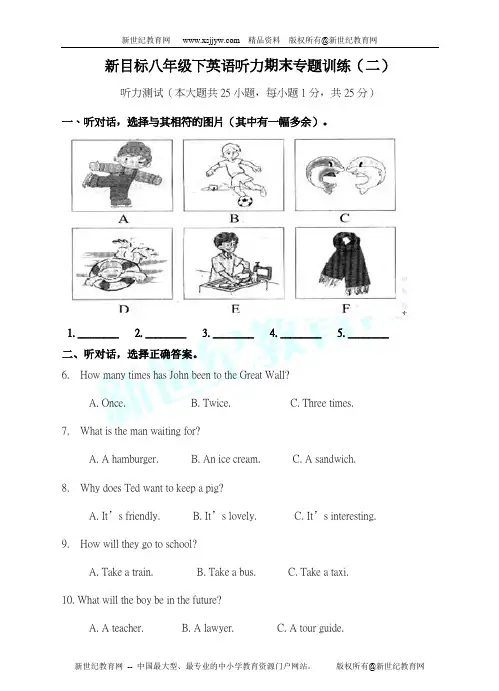
新目标八年级下英语听力期末专题训练(二)听力测试(本大题共25小题,每小题1分,共25分)一、听对话,选择与其相符的图片(其中有一幅多余)。
1. ________2. ________3. ________4. ________5. ________二、听对话,选择正确答案。
6. How many times has John been to the Great Wall?A. Once.B. Twice.C. Three times.7. What is the man waiting for?A. A hamburger.B. An ice cream.C. A sandwich.8. Why does Ted want to keep a pig?A. It’s friendly.B. It’s lovely.C. It’s interesting.9. How will they go to school?A. Take a train.B. Take a bus.C. Take a taxi.10. What will the boy be in the future?A. A teacher.B. A lawyer.C. A tour guide.三、听对话,选择正确答案。
11. Where did Jim go for his vacation?A. To Disneyland.B. To the space museum.C. To the water park.12. Whom did Jim go there with?A. His brother.B. His father.C. His mother.13. How did Jim go there?A. By subway.B. By train.C. By plane.14. How long did Jim stay there?A. For two days.B. For three days.C. For three weeks.15. When will Tina probably go there?A. This winter.B. Next summer.C. Next winter.四、听短文,选择正确答案。
人教版英语八年级下册试题听力录音稿及答案
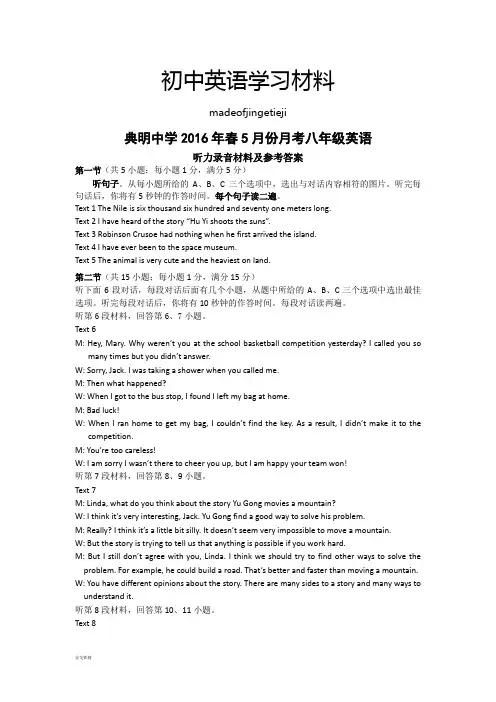
初中英语学习材料madeofjingetieji典明中学2016年春5月份月考八年级英语听力录音材料及参考答案第一节(共5小题;每小题1分,满分5分)听句子。
从每小题所给的A、B、C三个选项中,选出与对话内容相符的图片。
听完每句话后,你将有5秒钟的作答时间。
每个句子读二遍。
Text 1 The Nile is six thousand six hundred and seventy one meters long.Text 2 I have heard of the story “Hu Yi shoots the suns”.Text 3 Robinson Crusoe had nothing when he first arrived the island.Text 4 I have ever been to the space museum.Text 5 The animal is very cute and the heaviest on land.第二节(共15小题;每小题1分,满分15分)听下面6段对话,每段对话后面有几个小题,从题中所给的A、B、C三个选项中选出最佳选项。
听完每段对话后,你将有10秒钟的作答时间。
每段对话读两遍。
听第6段材料,回答第6、7小题。
Text 6M: Hey, Mary. Why weren’t you at the school basketball competition yesterday? I called you so many times but you didn’t answer.W: Sorry, Jack. I was taking a shower when you called me.M: Then what happened?W: When I got to the bus stop, I found I left my bag at home.M: Bad luck!W: When I ran home to get my bag, I couldn’t find the key. As a result, I didn’t make it to the competition.M: You’re too careless!W: I am sorry I wasn’t there to cheer you up, but I am happy your team won!听第7段材料,回答第8、9小题。
八年级英语听力训练材料
八年级英语听力训练材料1.八年级英语听力训练材料篇一Ⅰ. 听句子,选择正确图片。
每个句子读一遍。
(5分)1. ___2. ___3. ___4. ___5. ___Ⅱ. 听句子, 选择与句意相近的答案。
每个句子读一遍。
(5分)( )6. A. Mike won the match.B. Mike and I felt excited.C. Mike and I took part in the football match.( )7. A. Ann can’t look after her mother.B. Ann can look after herself.C. Ann doesn’t look after herself.( )8. A. Beijing Opera is very popular with most old people.B. Beijing Opera is not popular with most old people.C. Most old people think that Beijing Opera is very popular.( )9. A. I’m very proud of my elder brother.B. I’m proud of my younger brother.C. My little brother is proud of me.( )10. A. Tom is an amazing boy.B. Tom felt surprised.C. Tom told me an amazing story.Ⅲ. 听对话, 选择正确答案。
每段对话读两遍。
(5分)( )11. What’s the man’s favorite film?A. Cats.B. The Sound of Music.C. Titanic.( )12. Does the woman have a ticket?A. Yes, she does.B. No, she doesn’t.C. We don’t know.( )13. What does the woman think of the movie?A. She doesn’t like it at all.B. She likes its music.C. She thinks it’s just so-so.( )14. What’s Tom’s plan for next week?A. He is going to Beijing.B. He will have to do housework at home.C. He has lots of work to do.( )15. How does Tom like Beijing Opera?A. Very funny and interesting.B. Boring.C. Moving.Ⅳ. 听对话, 选择正确答案。
仁爱版英语八年级下册8BUnit6_Topic2_听力基础训练(含答案和听力材料)
仁爱版英语八年级下册8BUnit6_Topic2_听力基础训练(含答案和听力材料)Unit 6 Topic 2 听力基础训练Ⅰ. 听句子,选择正确答语。
每个句子读一遍。
1. A. That’s OK. B. Don’t worry. C. No, thanks.2. A. Yes, I know Helen. B. Yes, this is Helen speaking. C. Yes, I’m here.3. A. No, they’re too busy. B. Yes, they should. C. No, they won’t.4. A. You bet! B. We have no time. C. Oh, you look very happy.5. A. Yes, of course. B. OK, I’d like to. C. You are right.Ⅱ. 听对话,选择正确答案。
每段对话读两遍。
6. Where will Lily live if she goes to Canada for her vacation?A. In Tony’s house.B. In a hotel.C. In Tony’sfriend’shouse.7. Who is looking forward to meeting the teacher?A. Mike.B. Jenny.C. Jim.8. Why does Bill look happy?A. He will go to Dalian.B. He will go to Hangzhou.C. He will go to Nanjing.9. Where will Betty visit?A. She will visit the Ming Tombs.B. She will visit the West Lake.C. She will visit the Great Wall.10. How will David explore the northeast of China?A. By bus.B. By bike.C. By car.Ⅲ. 听两段对话,选择正确答案。
新目标8年级下Units 6--10综合听力训练(含听力试题ppt,录音材料及答案,听力mp3)
金榜英语工作室 制作
新目标英语7年级上册同步听力训练 新目标英语8年级上册同步听力训练 新目标英语9年级全册同步听力训练
中考英语听力与口语考试突破训练
新目标英语8年级上同步听说训练
最新高考英语听力适应训练★ ★ ★ ★
最新高考英语听力模拟训练★ ★ ★ ★
2013 中考英语听力模拟训练(B篇)
A. It’s too expensive.
B. It’s not nice at all.
C. It’s very cheap.
3. How many times has the man been to the golf club?
A. Once.
B. Twice.
C. Three times.
4. Which one is TRUE about Dan? A. He will never travel to London again. B. He has never been to London. C. It is the greatest trip he has ever had. 5. What made Jim so tired? A. He couldn’t fall asleep because of his neighbor’s party. B. He worked too late into the night. C. He worked for long hours during the day.
II. 听小对话,选择正确的答案。 1. What is Nick going to do? A. Go to Shenzhen by air. B. Leave the dog alone. C. Look after the dog.
八年级英语上册Module3测试题(外研版教材全解带答案听力mp3)
20XX年八年级英语上册Module3 测试题(外研版教材全解带答案听力 mp3)一、听力测试(满分15 分)(一)听句子,选择与所听内容符合的图片。
(每个句子读一遍) (每题 1 分,满分 5 分 )(二)听对话,判断以下句子的正(T )误( F)。
(对话读两遍)(每题 1 分,满分 5 分)6.Lucy likes running very much.( )7.Lucy runs faster than Mary.( )8.Both Lucy and Jack like the long jump.( )9.Jack likes the high jump and the long jump.( )10.Jack is going to be in the high jump team this year.( ) (三)听短文,选择正确答案。
(短文读两遍) (每题 1 分,满分 5分)11.______is/are popular with all the people in the world.A. FilmsB. MusicC. Sports12.Lots of people like sports because_______.A. they can make us have a healthier bodyB. they can help people make friendsC. both A and B13.In many Chinese schools there are_______.A. school carsB. sports teamsC. dance parties14.Girl students like playing _______at school.A. volleyball and table tennisB. football and basketballC. clothes and books15.China got_______ medals ( 奖牌 ) in 2008 Beijing Olympic Games.A. fiftyB. seventyC. one hundred二、单项填空(每题 1.5 分,满分 15 分)16. —How about watching TV at home?—It ’ s too _______.Let’ s play football.A. boringB. interestingC. excitingD. relaxing17.—Do you mind ________ the window? It ’ s a bit hot.—Of course not.18.I think playing basketball is_______ dangerous than swimming.A. moreB. veryC. betterD. much19.The teacher was very pleased_______ Tony’ s answer.A. withB. onC. inD. for20.I ’ m sure we can ________ the game. In my mind, nobody can _________ us.A. win; winB. win; beatC. beat; beatD. beat; win21.( 2016• 山东威海) I looked through my test paper again and again _______ I wouldn ’ t make any mistakes.22.(2016• 陕西 )_______ you speak, ___________ your English will be.A. The less; the moreB. The more; the betterC. The less; the betterD. The more; the less23.It ’ s important_______ the piano well.24.( 2016• 南宁) I have _______ finished my homework. I finished it an hour ago.A. yetB. alreadyC. everD. never25.—I made some mistakes at the dinner table last night.—_______. I ’ll tell you some table manners later.A. Of courseB. Never mindC. You’ re welcomeD. I ’ m sorry三、完形填空(每题 1.5 分,满分 15 分)There is a saying, “ No sports, no life. Sports” are very important to us. Sports help us to stay26 and get good grades.Everyone in our class 27 sports. Our favourite 28 is PE. We only have PE lessons29 a week, but we play sports every day. The most popular sport in our class is basketball. The boys enjoy 30 it, and many of the 31 like it, too. Another popular sport is football and there32 a lot of football fans (球迷 ) in our class. When the weather is 33 ,we often play ping-pong outside. We hardly ever (几乎不) play volleyball. We think it ’s 34 .We have a basketball team. Our team often has friendship (友情 ) matches (竞赛 ) with teams from other schools. When there is a match, many of us go to 35 it. It ’ s very interesting.26.A. fitB. coolC. fatD. thin27.A. loveB. lovesC. lovingD. loved28.A. foodB. drinkC. subjectD. fruit29.A. twoB. two timeC. secondD. twice30.A. playB. playingC. playedD. to play31.A. studentsB. teachersC. girlsD. people32.A. wereB. areC. isD. was33.A. cloudyB. windyC. fineD. wet34.A. boringB. relaxingC. excitingD. interesting35.A. watchB. readC. lookD. look at四、阅读理解(每题 2 分,满分 20 分)A(2016•x 疆 )Kelly ’ s favorite subject is P.E. But she had a hard time in P.E. class. She was not good at jumping very far , she had trouble throwing a ball, and she couldn’t run really fast. Sometimes , some kids made fun of ( 讥笑 ) her. So why does Kelly love P.E. class?The reason is that her teacher Mr. Burns always tells her todo her best. Though she only ran for a few minutes, Mr. Burns said, “ Goodjob! Next time you will be able to go alittle longer.” Mr. Burns even put a small box on the,flsoorKelly would be able to practice jumping over it.That night when Kelly finished dinner,she put three boxesand began practicing jumping over them. She made it! Kelly thought to herself, “ TomorrowIwill be able to jump overthose boxes in P.E. class.”There was a relay race (接力赛 ) on Tuesday. Kelly wasscared that she would not be able to go very far. When Kelly ran around the track (跑道 ), she heard many cheers andkids shouting, “ GoKelly! You can do it! ”That was all she needed to hear. Kelly ran fast. She finished first! The kids cheered for her. Kelly felt so good. “,ThankMr.Burns,you”said Kelly.“ Kelly,you ran the race,not me.”“,Yesbut you always said I could do it.”依据资料内容选择最正确答案。
- 1、下载文档前请自行甄别文档内容的完整性,平台不提供额外的编辑、内容补充、找答案等附加服务。
- 2、"仅部分预览"的文档,不可在线预览部分如存在完整性等问题,可反馈申请退款(可完整预览的文档不适用该条件!)。
- 3、如文档侵犯您的权益,请联系客服反馈,我们会尽快为您处理(人工客服工作时间:9:00-18:30)。
八年级英语听力练习mp3材料
[02:36.21]I'm your new teacher.My name is Wu Jun.
[02:42.61]We're going to have fun learning and speaking English this term.
[02:48.39]This is our first lesson,so I don't know all your names.
[02:55.65]Please say "here" when I call your name.
[03:03.80]We're going to have fun learning and speaking English this term.
[06:01.56]We have a lot of fun at school.
[06:27.40]Wu Jun is great fun.
[06:53.36]We have fun learning English.
[08:20.27]It is the first day of this new term.
[08:27.19]It is the first time for Wu Jun to teach us.
[08:36.70]It is the first English lesson.
[09:11.94]call your name
[09:30.93]Please call me at six in the evening.
[09:59.85]Wu Jun is calling Ma Lin's name in class.
[10:16.07]They call Wu Jun Mr.Wu.
[11:19.00]A:Excuse me.I'm sorry I'm late because the traffic is bad.
[12:15.14]B:It doesn't matter,but tomorrow,please be on time.
[12:44.58]A:Yes,sir.Thank you.
[14:25.20]Today is Thursday,September 10th,Teachers' day.Happy Teachers' day,Mr Wu.
[14:38.76]Here is a card for you with our best wishes.
[16:53.92]Teachers' Day term.
[17:09.75]Mothers' Day
[17:20.51]Children's Day
[17:36.13]Women's Day
[18:39.69]Merry Christmas!
[19:44.94]Tom's bike;the girl's father
[19:59.49]those girls' skirts
[20:54.53]September 10 Teachers' Day
[21:08.27]March 8 Women's Day
[21:12.84]June 1 Children's Day
[21:17.39]January 1 New Year's Day
[21:42.31]Here is a card for you with our best wishes.
[21:47.14]With our best wishes!
[21:59.81]Best wishes!
[22:49.44]a Teachers' Day card
[22:55.37]a New Year card
[23:03.13]a Christmas card
[23:09.90]a birthday card
[23:50.15]Best wishes!
[23:57.88]With best wishes!
[24:01.12]Best wishes to you!
[24:04.57]Best wishes for Children's Day!
[25:23.04]Dear Mr.Wu,Thank you for making English fun.Class 3,Grade 2.
[25:44.59]thank you for...
[25:55.62]Thanks for your help。
